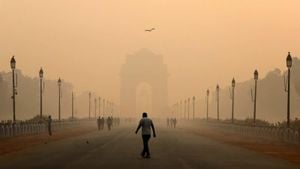More than 30 pilot whales were rescued after becoming stranded on Ruakākā Beach, located near Whangārei, on Sunday. This rescue effort showcased both community spirit and the dedication of local authorities and conservationists working together to save these majestic marine animals.
The Department of Conservation (DOC) reported most of the whales were successfully refloated and swam back out to sea. Unfortunately, three adult whales and one calf did not survive the ordeal. Fortunately, no additional whales became stranded after the rescue efforts.
The local Māori group, Patuharakeke, played a leading role in the rescue, collaborating with DOC officials and volunteers from the public. The community’s response reflected enormous care for wildlife and mankind's role in nature. People banded together to slide the whales onto sheets to lift and carry them gently back to the water.
Whale stranding is often seen as a perplexing natural phenomenon. New Zealand is known for having one of the highest rates of whale strandings globally. The geography of the coastline, with its shallow and sloping beaches, can mislead species like pilot whales, which navigate primarily through echolocation.
After the initial rescue, the Patuharakeke group stayed on the beach throughout the night to monitor the situation, ensuring the refloated whales did not return to the shore. This commitment was noted by DOC's operations manager, Joel Lauterbach, who described the entire rescue effort as “incredible, with everyone coming together for the whales.” He expressed gratitude toward all parties involved, especially those from Patuharakeke and Project Jonah, who provide aid to stranded marine mammals.
“It’s amazing to witness the genuine care and compassion people have shown toward these magnificent animals,” Lauterbach added, underscoring the community’s pivotal role. The DOC typically responds to around 85 whale and dolphin strandings each year, with most incidents involved single animals.
Following the rescue of the larger group, conservation teams continued to monitor Ruakākā Beach to prevent any re-stranding incidents. The dedication of the local community shone through once again, showing how deeply interconnected human beings are with nature.
Despite the excellent rescue efforts, the deaths of four of the pilot whales prompted the community to hold a Māori ceremony to honor their lost kin. Such ceremonies are significant; they reflect both respect for the creatures and recognition of the broader ecological relationships at play.
This stranding was not the first, nor will it likely be the last incident of this nature. Nevertheless, as local residents and wildlife advocates work hand-in-hand, there’s hope for future rescue efforts to protect these marine giants. With their expertise and the passion to save wildlife, communities like those around Ruakākā Beach represent the potential for coexistence and compassion between humans and nature.
Keeping things fresh, this incident proves yet again how, sometimes against the odds, people can come together for the sake of wildlife. Their efforts highlight both the vulnerabilities of marine species and the capacity for humans to rally together to make meaningful impacts on the lives of animals.



